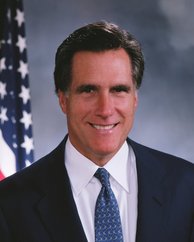Media Overload on Mitt Romney’s “Poor” Comment Comes Nearly Four Months Late
The former Massachusetts governor served up a nearly identical quote at the Dartmouth College New Hampshire debate in mid-October

“I’m not concerned about the very poor. We have a safety net there, and if it needs repair I’ll fix it. I’m not concerned about the very rich, they’re doing just fine. I’m concerned about the very heart of America, the 90-95% of Americans who are right now struggling.”
The sound byte received substantial coverage across hundreds of traditional and digital news outlets throughout the day with headlines such as:
Did Mitt Romney just disrespect poor Americans? – Christian Science Monitor
Mitt Romney Doesn’t Care About Poor People: Do You? – International Business Times
Is Romney Too Rich and Out of Touch? – Reuters
So what’s wrong with this picture?
What’s wrong is that the media ignored an almost identical comment Romney delivered nearly four months ago in a forum that had a much larger and more captive audience – the Bloomberg / Washington Post New Hampshire debate held on October 11th at Dartmouth College.
A little over halfway into that debate, the moderators permitted each candidate to ask a question of another.
Newt Gingrich posed the following (lengthy) question to Mitt Romney on his tax plan:
Governor Romney, I’d like to say, first of all, there is an awful lot in your plan that is very good, and that I think would be very helpful if implemented, a lot better than what Obama is doing. But one of the characteristics of Obama in his class warfare approach has been to talk about going after people who made over $250,000 a year and divide us. And I was a little surprised – I think it’s about page 47 of your plan – that you have a capital gains tax cut for people under $200,000, which is actually lower than the Obama model. Now, as a businessman, you know that you actually lose economic effectiveness if you limit capital gains tax cuts only to people who don’t get capital gains. So, I’m curious, what was the rationale for setting an even lower base marker than Obama had?”
Below is Romney’s complete answer, bolded in pertinent part for emphasis:
“Well, the reason for giving a tax break to middle income Americans is that middle income Americans have been the people who have been most hurt by the Obama economy. The reason that you’re seeing protests, as you indicated, on Wall Street and across the country is, middle income Americans are having a hard time making ends meet. Not only do we have 25 million people out of work, or stopped looking for work, or part-time jobs needing full-time employ, we just saw this week that median income in America has declined by 10 percent during the Obama years. People are having a hard time making ends meet. And so if I’m going to use precious dollars to reduce taxes, I want to focus on where the people are hurting the most, and that’s the middle class. I’m not worried about rich people. They are doing just fine. The very poor have a safety net, they’re taken care of. But the people in the middle, the hard-working Americans, are the people who need a break, and that is why I focused my tax cut right there.”
Romney essentially provided the same answer to Gingrich as he did to Soledad O’Brien, except he flipped the order in which he talked about not being worried about or concerned with the “rich” and the “poor.”
If anything, the substance of Romney’s comments to CNN were tamer than the statement he made last October, as he voluntarily mentioned the possibility of fixing holes in the safety net – something he did not do in the New Hampshire debate.
What this incident reveals is twofold.
First, selective media attention (and outrage). Although Romney revealed the same idea and policy position in both forums, it made headlines Wednesday because the quote on CNN had a slightly better sound byte. Moreover, although Romney had co-frontrunner status back in mid-October, the media now sees him more than ever as the presumptive nominee. As such, his comments are sifted through with an even finer-toothed comb.
Second, the fact that Romney has repeated this message on at least two occasions (and perhaps more on the campaign trail), suggests his choice of words was not an accident – it’s part of his campaign rhetoric.
The media, of course, is whimsical on what it chooses to focus and when, but whether or not Romney should be punished for holding this policy position is for the voters to decide.
Follow Smart Politics on Twitter.
